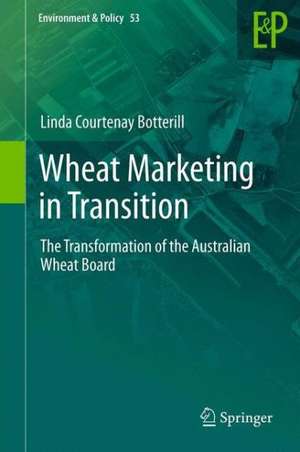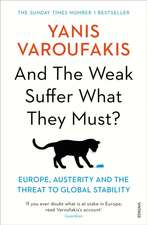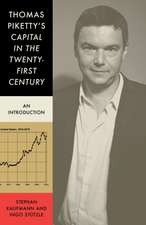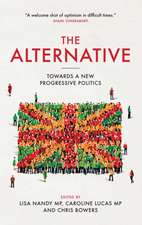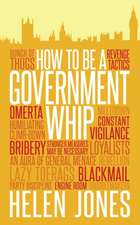Wheat Marketing in Transition: The Transformation of the Australian Wheat Board: Environment & Policy, cartea 53
Autor Linda Courtenay Botterillen Limba Engleză Paperback – 22 feb 2014
| Toate formatele și edițiile | Preț | Express |
|---|---|---|
| Paperback (1) | 633.19 lei 6-8 săpt. | |
| SPRINGER NETHERLANDS – 22 feb 2014 | 633.19 lei 6-8 săpt. | |
| Hardback (1) | 639.90 lei 6-8 săpt. | |
| SPRINGER NETHERLANDS – 6 ian 2012 | 639.90 lei 6-8 săpt. |
Din seria Environment & Policy
- 18%
 Preț: 783.68 lei
Preț: 783.68 lei - 15%
 Preț: 641.20 lei
Preț: 641.20 lei -
 Preț: 402.78 lei
Preț: 402.78 lei -
 Preț: 407.01 lei
Preț: 407.01 lei - 15%
 Preț: 641.85 lei
Preț: 641.85 lei - 18%
 Preț: 955.08 lei
Preț: 955.08 lei - 18%
 Preț: 944.82 lei
Preț: 944.82 lei - 15%
 Preț: 650.19 lei
Preț: 650.19 lei - 18%
 Preț: 952.89 lei
Preț: 952.89 lei - 15%
 Preț: 642.68 lei
Preț: 642.68 lei - 18%
 Preț: 1227.36 lei
Preț: 1227.36 lei - 18%
 Preț: 1226.90 lei
Preț: 1226.90 lei - 15%
 Preț: 642.18 lei
Preț: 642.18 lei - 15%
 Preț: 641.53 lei
Preț: 641.53 lei - 15%
 Preț: 643.48 lei
Preț: 643.48 lei -
 Preț: 385.25 lei
Preț: 385.25 lei - 20%
 Preț: 335.52 lei
Preț: 335.52 lei - 15%
 Preț: 640.88 lei
Preț: 640.88 lei - 15%
 Preț: 638.43 lei
Preț: 638.43 lei - 15%
 Preț: 636.12 lei
Preț: 636.12 lei - 18%
 Preț: 941.50 lei
Preț: 941.50 lei - 18%
 Preț: 946.55 lei
Preț: 946.55 lei - 18%
 Preț: 945.30 lei
Preț: 945.30 lei - 18%
 Preț: 948.29 lei
Preț: 948.29 lei - 18%
 Preț: 959.19 lei
Preț: 959.19 lei - 18%
 Preț: 957.44 lei
Preț: 957.44 lei - 18%
 Preț: 955.70 lei
Preț: 955.70 lei - 15%
 Preț: 639.90 lei
Preț: 639.90 lei
Preț: 633.19 lei
Preț vechi: 744.93 lei
-15% Nou
Puncte Express: 950
Preț estimativ în valută:
121.18€ • 126.04$ • 100.04£
121.18€ • 126.04$ • 100.04£
Carte tipărită la comandă
Livrare economică 14-28 aprilie
Preluare comenzi: 021 569.72.76
Specificații
ISBN-13: 9789400793408
ISBN-10: 9400793405
Pagini: 160
Ilustrații: XII, 148 p.
Dimensiuni: 155 x 235 x 8 mm
Greutate: 0.22 kg
Ediția:2012
Editura: SPRINGER NETHERLANDS
Colecția Springer
Seria Environment & Policy
Locul publicării:Dordrecht, Netherlands
ISBN-10: 9400793405
Pagini: 160
Ilustrații: XII, 148 p.
Dimensiuni: 155 x 235 x 8 mm
Greutate: 0.22 kg
Ediția:2012
Editura: SPRINGER NETHERLANDS
Colecția Springer
Seria Environment & Policy
Locul publicării:Dordrecht, Netherlands
Public țintă
ResearchCuprins
Preface.- 1. Introduction.- 2. Australian Wheat Industry Policy in Context.- 3. The Birth of Collective Wheat Marketing.- 4. From Orderly Marketing to Deregulation 1948-1988.- 5. From Domestic Deregulation to Privatisation.- 6. The Monopoly Wheat Exporter and the Dictator.- 7. The Aftermath of Oil-for-Food and the Death of an Institution.- 8. Lessons and Reflections.- Index.
Notă biografică
Linda Courtenay Botterill is Professor in Australian Public Policy at the University of Canberra, Australia. Her field of expertise is Australian politics and public policy with a focus on rural policy and politics. Professor Botterill’s work in this area builds on nearly fifteen years as a public policy practitioner in the Australian Public Service, as a policy officer in two industry associations and as an adviser in the Office of the Minister for Primary Industries and Energy. Her work is focused on the policy development process with a particular interest in the role of values in the policy process and how these values become embodied in institutional structures.
Textul de pe ultima copertă
This detailed account tells the background story of a privatised monopoly whose sharp practices embroiled a national government in scandal and shocked a nation that prides itself on the strength of its institutions. AWB Limited, the former Australian Wheat Board that in the 1990s was sold into the private sector, paid more than $US200m in kickbacks to the pariah regime of Saddam Hussein in Iraq, exploiting the provisions of the United Nations’ Oil for Food program by inflating the price of the wheat it sent there to disguise the pay-offs that secured the contracts. The ensuing uproar threatened the careers of key cabinet ministers in the Howard government and contributed to the rise and subsequent election victory of the Australian Labor Party’s Kevin Rudd.
There is no doubting wheat’s centrality as a commodity. Of all the basic foodstuffs, this versatile grain is a vital cog in the international trading mechanism, arousing passion and ambition in equal measure. The 60-year history of the Australian Wheat Board and its subsequent privatised incarnation is a fascinating—and much misunderstood—story that involves decision-makers at the highest level and commercial interests at their most competitive and rapacious. The board held a monopoly on Australian wheat exports for decades, seamlessly shifting into the private sector in 1995. Motivated by the misunderstandings surrounding this privatisation and the revelations that followed it in the mid-2000s, this volume sets the record straight with a comprehensive analysis of the genesis and development of an institution with its origins in mutuality that foundered in the perilous waters of cut-throat international trade. The author’s role as a strategic advisor in the privatisation ensures a uniquely informed perspective on a story that provides an object lesson in institutional management to governments around the world.
There is no doubting wheat’s centrality as a commodity. Of all the basic foodstuffs, this versatile grain is a vital cog in the international trading mechanism, arousing passion and ambition in equal measure. The 60-year history of the Australian Wheat Board and its subsequent privatised incarnation is a fascinating—and much misunderstood—story that involves decision-makers at the highest level and commercial interests at their most competitive and rapacious. The board held a monopoly on Australian wheat exports for decades, seamlessly shifting into the private sector in 1995. Motivated by the misunderstandings surrounding this privatisation and the revelations that followed it in the mid-2000s, this volume sets the record straight with a comprehensive analysis of the genesis and development of an institution with its origins in mutuality that foundered in the perilous waters of cut-throat international trade. The author’s role as a strategic advisor in the privatisation ensures a uniquely informed perspective on a story that provides an object lesson in institutional management to governments around the world.
Caracteristici
A comprehensive account, in unprecedented detail, of the privatisation of the Australian Wheat Board and its consequences Explains the development and demise of an institution with dangerous structural fault lines Tells the story of wheat marketing in Australia over six decades, providing important lessons for other nations such as Canada Contextual historical analysis of AWB Limited’s involvement in the Oil for Food scandal
